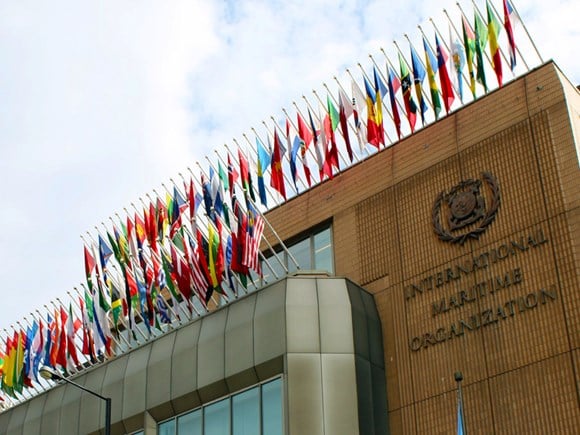After Tumultuous Week, IMO Makes Progress on Decarbonization

The IMO’s International Maritime Organization’s Intersessional Working Group on Reduction of Greenhouse Gas Emissions from Ships wrapped up a week of closed-door meetings with observers agreeing there had been progress and a promising outlook for the future. Observers said the working group had been able to rise above the rancor of the prior week’s special session of MEPC (Marine Environment Protection Committee) and get back to work on the Net-Zero Framework.
“We observed constructive participation from all parties — including those with prior concerns — which led to real progress on key technical guidelines,” said Dr. Annika Frosch, Research Fellow at UCL Shipping and Oceans Research Group. “Even previously contentious topics, such as the Net Zero Fund, experienced broad and active involvement from many delegations, helping to clarify priorities like establishing the Governing Board and fundamental principles to guide the fund’s future work.”
Many others, especially in the NGO community, expressed a renewed sense of optimism at the close of the working session on Friday, October 24. Delaine McCullough of the Clear Shipping Council highlighted that it had become clear that the adjournment was “just a postponement and not the end” of the framework. Emma Fenton, Senior Diplomacy Director at Opportunity Green, noted that countries had come together to work on the supporting guidelines that will provide the much-needed clarity.
The week before, member states that had supported the Net-Zero Framework in April 2025 moved away, and became cautious, in part due to strong pressure and threats from the United States and others. Saudi Arabia had joined with the United States, pressuring the member states before Singapore tabled the adjournment to give the IMO more time.
Many had left the first session, saying the IMO was giving confusing signals and creating more problems than solutions for the industry. Many wondered if the framework would even be adopted, or if it was the first step in its death knell. Even those who believed there would be progress had to concede that the regulation was now likely not to come into force till January 1, 2029.
“Understanding what happened at the IMO in October and why is now central not just for any chance of future adoption, but for just and equitable climate action generally,” commented Dr. Tristan Smith, Professor of Energy and Transport at UCL Shipping and Oceans Research Group. “This lost momentum can be recovered, but we have taken a step closer to the abyss that is dangerous climate change.”
The working group tackled the key challenges in the framework, and while there were no formal decisions, observers are saying there was steady progress in the discussion of the details for the implementation. Hot topics included how the regulation should incentivize energy transition, how the fund should be set up, and how the lifecycle and sustainability of different fuels should be evaluated and certified. Lifecycle analysis was widely discussed, and support seemed to be emerging to support differentiating rewards for different fuels. The role of biofuels was also a key topic.
Wind propulsion was also back in the spotlight, notes Anaïs Rios, Shipping Policy Officer for Seas at Risk. The International Windship Association highlights strong momentum for wind-assisted propulsion, reporting that there are nearly 100 large vessels with wind propulsion, representing around five million DTW. They expect the fleet will roughly double in the next 12 months and that this momentum will carry into the framework discussions. Similarly, John Maggs, Clean Shipping Coalition’s Representative at IMO, is calling for transforming the CII into an energy efficiency powerhouse to get shipping’s climate action back on course.
Christiaan de Beukelaer, Senior Lecturer in Culture and Climate at the University of Melbourne and an IMO observer, noted that the obstructionist states in the first week opposed adoption due to a lack of detail, and the second week opposed discussing details ahead of adoption. However, “under the conciliatory guidance of Working Group Chair Sveinung Oftedahl, the vast majority of delegations in the room worked on ensuring that the IMO can deliver on its unanimously-adopted 2023 GHG Strategy through the Net-Zero Framework. This made the saboteurs sound like a broken record, which the room quietly ignored."
The feeling was that the workgroup moved forward, “moving past obstruction and into real progress,” said Jamie Yates, Climate & Renewable Energy Manager for Pacific Environment. Natacha Stamatiou, IMO GHG Lead, Global Shipping for the Environmental Defense Fund, agreed, noting, “Luckily, this week, more voices joined the conversation, and the discussions took on a constructive and more respectful tone. It was a meaningful step toward rebuilding the confidence, transparency, and integrity we need to deliver the pollution cuts future generations deserve.”
Despite the sense of progress, much remains to be done, with many noting the Net-Zero Framework hangs in the balance. The IMO is scheduled to meet for a two-part summit in April 2026, including the next session of the Marine Environment Protection Committee. The goal is for MEPC to finalize important decisions with another round of negotiations. The adjournment calls for the member states to reconvene in October 2026.
